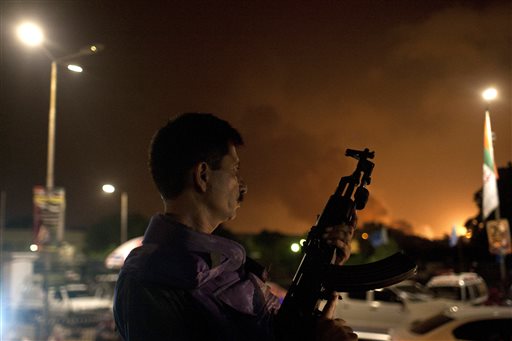KARACHI, Pakistan (AP) — Ten gunmen disguised as police guards attacked a terminal at Pakistan’s busiest airport with machine guns and a rocket launcher during a five-hour siege that killed 13 people as explosions echoed into the night, while security forces retaliated and killed all the attackers, officials said Monday.
The airport attack came as a separate suicide bombing in the country’s southwest killed 23 Shiite pilgrims returning from Iran, authorities said.
No one claimed responsibility for the attack on the Jinnah International Airport in Karachi, named after the founder of Pakistan, nor the suicide bombing in Baluchistan province. However, the attacks come as government-led peace talks with the local Taliban faction and other militants have floundered in recent weeks.
The airport attack began late Sunday and ended before dawn Monday in Karachi, a sprawling port city on Pakistan’s southern coast, although officials said all the passengers had been evacuated. During the course of the attack, heavy gunfire and multiple explosions could be heard coming from the terminal, used for VIP flights and cargo, as militants and security forces battled for control. A major fire rose from the airport, illuminating the night sky in an orange glow as the silhouettes of jets could be seen.
The deadly operation was carried out by 10 militants, said the chief minister of Sindh province, Qaim Ali Shah.
“They were well trained. Their plan was very well thought out,” he told reporters. He said they intended to destroy some of the aircraft and buildings but were not able to.
Rizwan Akhtar, the director general of paramilitary Rangers told reporters that the airport would be handed over to civilian authorities to resume normal operations later Monday. He said the attackers apparently were Uzbeks but authorities were still trying to determine their identities and nationalities.
The spokesman for the Pakistani military, Gen. Asim Bajwa, said on Twitter that no aircraft were damaged and that as a precautionary measure, security forces were sweeping the airport before operations would be returned to the Civil Aviation Authority and airport police.
At least some of the gunmen wore the uniforms of the Airport Security Force that protects the nation’s airports, said an official who briefed journalists near the airport. He said all were strapped with explosives. He said that when a guard one of them, the explosives strapped to his body went off. The official said another attacker also blew up after being shot at by security forces.
The official described himself as being with one of the country’s intelligence agencies but declined to give his name.
After storming into the airport grounds, gunmen took shelter in two sections of the airport, said senior police officer Ghulam Qadir Thebo.
“The blast you heard a little while ago was when our police party went to pick up a body (and) one of the attackers blew himself up,” Thebo said
Authorities seized four machine guns and a rocket launcher, Thebo said. He said the billowing smoke and flames was from oil that had caught fire.
Dr. Seemi Jamali from Jinnah Hospital in Karachi said 13 bodies had been brought to the hospital from the fighting. She said nine were Airport Security Force personnel, one was a member of the paramilitary Rangers, one was from the police, one was an employee of the Civil Aviation Authority and another was from the state-run Pakistan International Airlines.
Authorities diverted incoming flights and suspended all flight operations. A spokesman for the Civil Aviation Authority said the airport would be closed until at least Monday night.
Local news channels reported Monday morning that authorities were still searching the airport buildings and intermittent firing was still being heard.
Sarmad Hussain, a PIA employee, told The Associated Press he was at the airport at the time of the attack.
“I was working at my office when I heard big blasts — several blasts — and then there were heavy gunshots,” Hussain said. He said he and a colleague jumped out of a window to get away, and his colleague broke his leg.
Karachi is Pakistan’s largest city and has been the site of frequent militant attacks in the past. It is the country’s economic heart and any militant activity targeting the airport likely would strike a heavy blow at foreign investment in the country.
In May 2011, militants waged an 18-hour siege at a naval base in Karachi, killing 10 people in an assault that deeply embarrassed the armed forces.
There was no immediate claim of responsibility for Sunday night’s attack. Pakistan’s government has been trying to negotiate a peace deal with local Taliban fighters and other militants mostly based in the northwest who have been waging war against the government. But the talks have had little success, raising fears of a backlash of attacks across the country.
Security officials in Karachi had feared that if the talks broke down, their city would be a likely spot for any militant retribution. The Pakistani Taliban and their allies increasingly are gaining a foothold in Karachi.
In the suicide bombing, four bombers targeted Shiite pilgrims staying at a hotel in the town of Tuftan near the Iranian border, said Baluchistan province Home Minister Mir Sarfraz Bugti. One bomber was killed by security officials traveling with the pilgrims, but the other three managed to get inside the hotel where they blew themselves up in an attack that also wounded 10 people, he said.
It wasn’t immediately clear whether there was a connection between the airport assault and the Baluchistan attack. But the attacks were sadly familiar for Pakistan, which has seen thousands killed by militants in recent years.
___
Santana reported from Islamabad. Associated Press writers Abdul Sattar in Quetta, and Zarar Khan, Asif Shahzad and Munir Ahmed in Islamabad contributed to this report.
___
Follow Rebecca Santana on Twitter at www.twitter.com/ruskygirl.

COMMENTS
Please let us know if you're having issues with commenting.